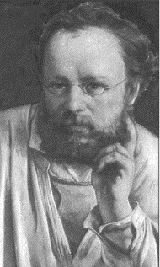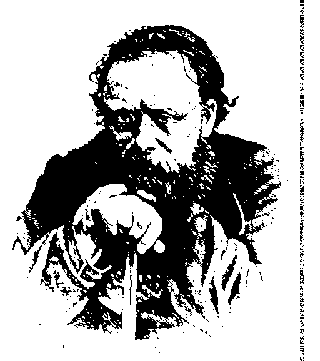Pierre-Joseph Proudhon


Proudhon is a rarity among anarchist philosophers in that he was of quite humble peasant origins. He began his working life herding cows and doing chores at home. His mother, Catherine Simonin, was determined that he get some education, however, and when the family moved into town in 1820 arrangements were made to enroll him in a school. The fees were waived through his father's employer's connections. Still without sufficient funds, he was routinely punished at school for "forgetting" the books he could not afford to buy. Although he intended to go on to study for a baccalaureate, family financial difficulties prevented him from pursuing a higher degree upon graduation and he turned his talents instead to the printer's trade, a profession which gave birth to many anarchists, but the first to call himself an anarchist was Proudhon.
By mid-century, Proudhon was the leading left intellectual in France or for that matter, all of Europe, far surpassing Marx's notoriety or Bakunin's. Proudhon, as Hyams noted (1979, p. 1), was among the inventors of socialism, along wih Marx, Bakunin, Blanqui, Blanc, Herzen, Lassalle and Engles. Of these, Proudhon had the profoundest effect upon the workers' movement in the 19th century and his ideas influenced some of the most notable later anarchists, including both Tolstoy and Bakunin, both of whom knew Proudhon personally. Indeed, throughout his life Proudhon acquired and kept a remarkable collection of friends, and as his notoriety spread, acquaintances. Friendship for Proudhon was more important than sexual love or marriage.
Before becoming a widely recognized public figure, Proudhon tramped the countryside in search of work at his trade. In 1832, at just about the time his fellow countryman, Alexis de Tocqueville, was roaming around the the United States, Proudhon set out on his own "Tour de France" looking for work. In the process he saw that the conditions of poverty which set him walking through France in search of work were not limited to his own home town. While he was able to find enough work to move from place to place, his search for permanent work met with little success These experiences contributed to an already developing senses of economic injustice. The seeds for this sense of injustice may have been planted via his maternal grandfather, Tornesi Simonin, who "had been the spokesman and leader of the small farmers and artisans in all their quarrels with the nobility: he had been particularly resentful of and ready to break the game-laws...and, as a formidable poacher, [was] repeatedly involved in rows and brawls with the local great landowners' gamekeepers." (Hyams, 1979, p. 10.) In 1833, after receiving news of his brother's mysterious death during military training after having threatened to expose his captain for misuse of army funds, Proudhon became an implacable enemy of the existing order. Much like Lenin, then, some of Proudhon's resentment toward authority may derive from a brother's death at the hands of abusive authority. (On Lenin's brother, see Buzinkai, D. "V.I. Lenin: Adolescent Rivalry and Identification", paper delivered at the 1982 Annual Meeting of the Northeast Political Science Association.)
Back in Besançon by the Fall of 1832, Proudhon was offered a job as an editor of a Fouriériste newspaper. His work as a printer allowed him access to a wide range of intellectual discussions, and in this haphazard way he acquired a wide ranging education. He taught himself Latin and became a much demanded compositor of Latin texts, and eventually held the more prestigious position of "corrector". It was through these activities that he came into contact with various authors of the day and eventually was able to win a fellowship that would allow him to pursue his studies full time and with complete independence, despite the fact that he did not have an academic background. Such was the strength of his native intellect.
For a period of years Proudhon moved back and forth between his native Besançon and Paris, never growing to appreciate the attractions of the capital. Nevertheless he pursued scholarly activities, producing an article on the letters of the alphabet, and on the significance of Sunday as a day of rest. In the latter article the first glimmerings of his anarchist future were so clearly seen that when his sponsors read the article, they warned him to avoid drifting into radical thought while awarding him a bronze medal for the essay. By this time he had managed to set up his own press with two partners and began publishing his own and others' works. But for his first overtly political book he sought other publishers. What is Property? An Inquiry into the Principle of Right and of Government brought Proudhon his first substantial public recognition, some of it not particularly welcome. In a characteristic gesture, he dedicated the book to the Academy of Besançon which had provided the fellowship and which would surely be scandalized by the product their largesse had wrought. In that work "He was denouncing the property of the man who uses it to exploit the labour of others without any effort on his own part, the property that is distinguished by interest, usury and rent, by the impositions of the non-producer upon the producer. Toward property regarded as 'possession', the right of a man to control his dwelling and the land and tools he needed to work and live, Proudhon had no hostility; he regarded it as a necessary keystone of liberty, and his main criticism of the Communists was that they wished to destroy it." (Woodcock, 1956, p. 45) To understand Proudhon's argument, one must grasp this distinction between possession and property, a distinction he graphically illustrated by comparing a lover as a possessor, and a husband as a proprietor! (Proudhon, 1994, p.36.) Property, for Proudhon is a legal faculty; Possession is a fact.
Like Godwin, Proudhon based his attack on property on his concept of justice: "'I build no system. I ask an end to privilege, the abolition of slavery, equality of rights, and the reign of law. Justice, nothing else. That is the alpha and omega of my argument.'" (Woodcock, 1956, p.46) "He argues that labour alone is the basis of value, but that this nevertheless does not give the labourer a right to property, since his labour does not create the material out of which the product is made. 'The right to products is exclusive; the right to means is common'." (ibid, p. 47.) Proudhon quotes the Scottish political economist Thomas Reid as follows: "The right to life implies a right to the means of life, and that rule of justice which demands respect for the life of an innocent man also demands that he not be deprived of the means of life: these two rights are equally sacred...To prevent the labour of another is the same sort of injustice as putting him in chains or throwing him into prison, and it provokes the same resentment." (Proudhon, 1994, p. 46-7.) Proudhon takes this principle and follows the reasoning to its logical conclusion. If there is a right to life, there is a right to the means of life, and since the right to life is shared equally by all, the right to the means to life must be equally shared. Proudhon reasoned: "Man needs to labour in order to live; consequently, he needs tools and materials to work upon. His need to produce constitutes his right, and his right is guaranteed by his fellows, with whom he makes a similar agreement." (ibid, p. 54.) Thus, society is formed not to protect property, put to protect access to the means of production.
For Proudhon, property and society are incompatible. In Chapter Two of What is Property, Proudhon wrote: "Property...is a right outside of society; for it is clear that if the wealth of each were social wealth, the conditions would be equal for all...Thus, if we are associated for the sake of liberty, equality, and security, we are not associated for the sake of property; thus if property is a natural right, this natural right is not social but antisocial. Property and society are completely irreconcilable with one another. It is as impossible to associate two proprietors as to joint two magnets by their opposite poles. Either society must perish, or it must destroy property." (Proudhon, 1994, p. 42-3.)
At the core of this conception is the principle of equality. Rights, by definition, are equal rights. Liberty, must be liberty for all, for "Liberty is the original condition of man; to renounce liberty is to renounce the quality of man." (Proudhon, 1994, p. 38.) He sums up this conception near the end of section one, chapter two: "... liberty is an absolute right because it is to man what impenetrability is to matter, a sine qua non of existence; equality is an absolute right because without equality there is no society; security is an absolute right because in the eyes of every man his own liberty and life are as precious as another's. These three rights are absolute, that is, susceptible of neither increase nor diminution because every member of society receives as much as he gives, --liberty for liberty, equality for equality, security for security, body for body, soul for soul, in life and in death." (Proudhon, 1994, p. 42.) This is equivalent to a marriage vow to society. To protect that marriage, property, in the sense of ownership, must be eliminated, for it is out of the inequality of property that war, violence, crime, and other social pathologies emerge.
This conception of property, as Woodcock has noted, was essentially a peasant's view of property relations. Proudhon knew little of the industrializing 19th century world. His experience was the experience of the peasant and small shopkeeper. Nevertheless, it was a vision that captured essential points about the transition from an agrarian to an industrialized society, and it clearly was a vision many of his contemporaries shared. The fame which What Is Property brought Proudhon, propelled him into the forefront of radical politics for the rest of his life, indeed throughout the 19th century and on through the Spanish Civil War. He was by far a more well known and influential figure than Marx as the revolutions of 1848 erupted. His fame led to his election to the National Assembly in 1848 where, in public debate, he drew attention to the rising power of the working class. As early as 1842 Proudhon had declared: "'Workers, laborers, men of the people, the initiative of reform is yours...The new socialist movement will begin by...the war of the workshop,' he wrote in his diary, and added another thought that echoed through the history of Latin Syndicalism down to the Spanish Civil War when he noted: 'The social revolution is seriously compromised if it comes through a political revolution.'" (Woodcock, 1992, p. 149.)
The main themes of Proudhon's thought were constant throughout most of his work. He criticized political revolutions from above, clearly identifying the darker side of the socialist vision to which revolutionaries in the Marxist tradition have succumbed. Centralized government, organized for whatever purpose, is an evil to be countered by a decentralized, mutualist economy. The federalist theme which runs through his work was designed to counter the centralization of the developing nation states. It was a federalism far different from the federalism pursued in the United States or Switzerland. It was a federalism in which real power resided at the local level, rather than being "devolved" from on high. Finally, he clearly identified the working class as an autonomous revolutionary force which would eventually win its own freedom.

